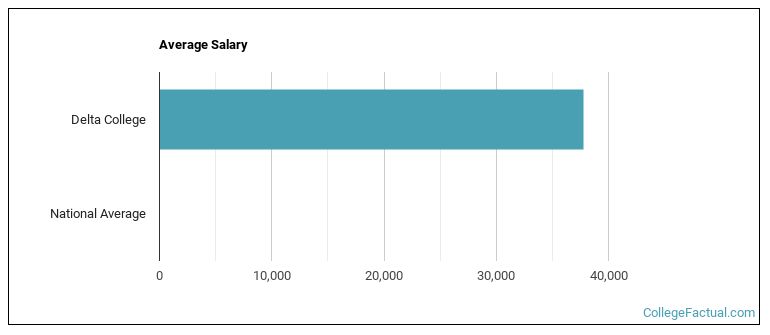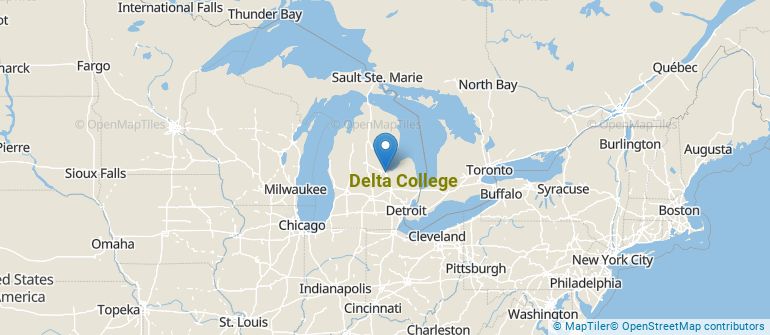 by our College Data Analytics Team
by our College Data Analytics Team
College Factual analyzes over 2,000 colleges and universities in its annual rankings and ranks them in a variety of ways, including most diverse, best overall quality, best for non-traditional students, and much more.
Delta College was awarded 29 badges in the 2025 rankings. The highest ranked major at the school is general studies.
Explore the best ranked schools for the programs you are most interested in.
Delta College is ranked #781 out of 2,152 schools in the nation for overall quality on College Factual's 2025 Best Colleges list. This is an improvement over the previous year, when Delta College held the #1,187 spot on the Best Overall Colleges list.
Out of the 56 colleges in Michigan, Delta College is ranked at #19.
Returning adults and other non-traditional students may appreciate the fact that Delta College has an open admissions policy. This means that you'll only have to submit basic materials, which may include proof that you completed high school or an equivalent program.
With a student to faculty ratio of 15 to 1, Delta College is about average in this regard as the nationwide rate is 15 to 1. While this does not translate directly to class size, it's a good indicator of how much time professors will have to spend with their students on a one-on-one basis.
Another measure that is often used to estimate how much access students will have to their professors is how many faculty members are full-time. The idea here is that part-time faculty tend to spend less time on campus, so they may not be as available to students as full-timers.
The full-time faculty percentage at Delta College is 100%. This is higher than the national average of 47%.
The freshmen retention rate tells us what percentage of first-year, full-time students choose to continue on to their sophomore year at a particular school. The rate at Delta College is 64%, which is about average when compared to the national rate of 68%.
During the 2017-2018 academic year, there were 6,954 undergraduates at Delta College with 2,383 being full-time and 4,571 being part-time.
| $0-30 K | $30K-48K | $48-75 | $75-110K | $110K + |
|---|---|---|---|---|
| $1,847 | $2,258 | $5,711 | $8,920 | $10,901 |
The net price is calculated by adding tuition, room, board and other costs and subtracting financial aid.Note that the net price is typically less than the published for a school. For more information on the sticker price of Delta College, see our tuition and fees and room and board pages.
It's not uncommon for college students to take out loans to pay for school. In fact, almost 66% of students nationwide depend at least partially on loans. At Delta College, approximately 9% of students took out student loans averaging $4,478 a year. That adds up to $17,912 over four years for those students.

Get more details about the location of Delta College.

Contact details for Delta College are given below.
| Contact Details | |
|---|---|
| Address: | 1961 Delta Road, University Center, MI 48710 |
| Phone: | 989-686-9000 |
| Website: | https://www.delta.edu/ |
| Most Popular Majors | Bachelor’s Degrees | Average Salary of Graduates |
|---|---|---|
| Liberal Arts General Studies | 413 | NA |
| Nursing | 132 | NA |
| Precision Metal Working | 54 | NA |
| Allied Health Professions | 48 | NA |
| Criminal Justice & Corrections | 36 | NA |
| Health & Medical Administrative Services | 31 | NA |
| Human Development & Family Studies | 30 | NA |
| Business Administration & Management | 28 | NA |
| Dental Support Services | 22 | NA |
| Entrepreneurial Studies | 21 | NA |
Online learning is becoming popular at even the oldest colleges and universities in the United States. Not only are online classes great for returning adults with busy schedules, they are also frequented by a growing number of traditional students.
In 2022-2023, 4,740 students took at least one online class at Delta College. This is an increase from the 4,629 students who took online classes the previous year.
| Year | Took at Least One Online Class | Took All Classes Online |
|---|---|---|
| 2022-2023 | 4,740 | 2,493 |
| 2021-2022 | 4,629 | 2,259 |
| 2020-2021 | 6,163 | 3,683 |
| 2018-2019 | 2,507 | 854 |
Footnotes
*The racial-ethnic minorities count is calculated by taking the total number of students and subtracting white students, international students, and students whose race/ethnicity was unknown. This number is then divided by the total number of students at the school to obtain the racial-ethnic minorities percentage.
References
More about our data sources and methodologies.